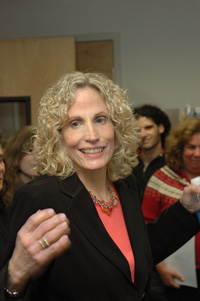"Our students want to use music to change the world. They've often known somebody who's had a disability or is different. Or maybe they themselves had an accident or an illness. They've had personal experience with it, somehow, somewhere. I had a difficult childhood that led me to music therapy, and I also had an accident as an adult. I was already in the field at the time, but both of those things give me insight, I think, into what I do. I think my childhood experience gave me insight into perseverance, resilience. I think a lot of our students come in with such resilience. Somebody in their family or they themselves have conquered something, and they want to help others do the same. And I love that about them."
"Some students come with classical training, but we're using more contemporary music and improvisation. So in music therapy, where the client is the center, people will come with disabilities, with emotional issues, pain of a physical or psychological nature, or cognitive disabilities, and the therapist has to be able to meet whatever comes. To be able to improvise is a critical skill, and not all programs teach that. To mold the method to the client is central to the music at Berklee, and to be able to do that therapeutically is critical. As a result, our students are leaving here able to go out and write their own ticket. The internship programs really want our students. It's live music; it's based on improvisation; it's adaptable; and they love that."
"Students come in wanting to investigate certain areas, and we ask, 'How do you want to do that?' They start their own programs, they develop new ideas, and then take them out and teach others. And that's really exciting. That's the Berklee model: what do you want to do and how can we help you do it?"

